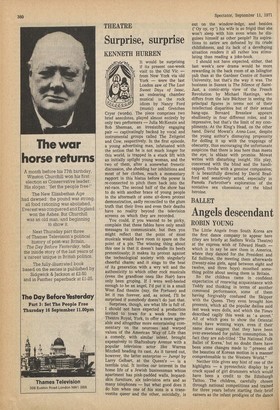THEATRE
Surprise, surprise
KENNETH HURREN
It would be surprising if its present one-week visit to the Old Vic — from New York via old York — were the last London saw of The Last Sweet Days of Isaac, an endearing chamber musical in the rock idiom by Nancy Ford (music) and Gretchen Cryer (words). The piece comprises two brief anecdotes, played almost entirely by only two performers — Julia McKenzie and Bob Sherman, an irresistibly engaging pair — captivatingly backed by vocal and instrumental groups called The Zeitgeist and Cow, respectively. In the first episode, a young advertising man, infatuated with the notion that he is not much longer for this world, is trapped in a stuck lift with an initially uptight young woman, and the two of them, after a somewhat frenetic discussion, she shedding her inhibitions and most of her clothes, reach a momentary rapport in this hiatus before the power is re-connected to pitch them back into the rat-race. The second half of the show has to do with another brace of young people in the aftermath of some sit-down protest demonstration, sadly reconciled to the glum truth that their lives and even their deaths have no reality beyond the television screens on which they are recorded.
You could, if you wanted to be picky, complain that these fables have only small messages to communicate, but then you might reflect that the point of most musicals would have room to spare on the point of a pin. The winning thing about this one is that it doesn't handle its beefs pretentiously; it makes its protest against the technological society with singularly cheerful charm; and it sings to the beat of its generation with a wry wit and the authenticity to which other rock musicals (even the grandiose ones like Hair) have only been groping. If I were well-heeled enough to be an angel, I'd put it in a small West End theatre (say, the Fortune) and let it run forever, and, as noted, I'll be surprised if somebody doesn't do just that.
Surprises, though, are what life is full of. I should not have expected a production invited to town for a week from the Theatre Royal, York, to offer a more agreeable and altogether more entertaining commentary on the neuroses and warped values of the American Way of Life than a comedy, with similar intent, brought expensively to Shaftesbury Avenue with a popular television actor like Warren Mitchell heading its cast. As it turned out, however, the latter enterprise — Jump! by Larry Gelbart, at the Queen's — is a terrible trial. It invites our interest in the home life of a Jewish businessman whose apartment has pink-padded walls, leopardskin furniture, six television sets and as many telephones — but what good does it do him when one of his sons is a transvestite queer and the other, suicidally, is out on the window-ledge, and besides (' Oy oy, oy ') his wife is so frigid that she won't sleep with him even when he disguises himself as other people? Its aspirations to satire are defeated by its crude childishness, and its lack of a devetoping situation renders it all rather less stimulating than reading a joke-book.
I should not have expected, either, that last week's new drama would be more rewarding in the back room of an Islington pub than at the Gardner Centre of Sussex University, but that's the way it was. The business in Sussex is The Silence of SaintJust, a comic-strip view of the French Revolution by Michael Hastings, who differs from the late Bilchner in seeing the principal figures in terms not of their intellectual disparities but of their sexual hang-ups. Bernard Bresslaw appears ebulliently in four different roles, and is impressive, but that's the limit of my compliments. At the King's Head, on the other hand, David Mowat's Anna-Luse, despite the young author's dismaying propensity for dolling it up with the trappings of obscurity, thus encouraging the unfortunate suspicion that there is less here than meets the eye, is ablaze with promise. Mowat writes with disturbing insight. His play, concerned with the blind and the handicapped, throbs with a genuine compassion; it is beautifully directed by David Bradford and sensitively acted, especially in Pamela Farbrothees exploration of the tentative sex obsessions of the blind heroine.










































 Previous page
Previous page